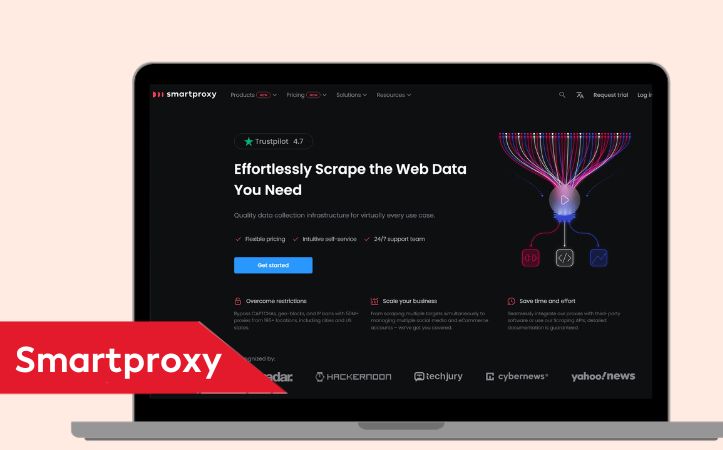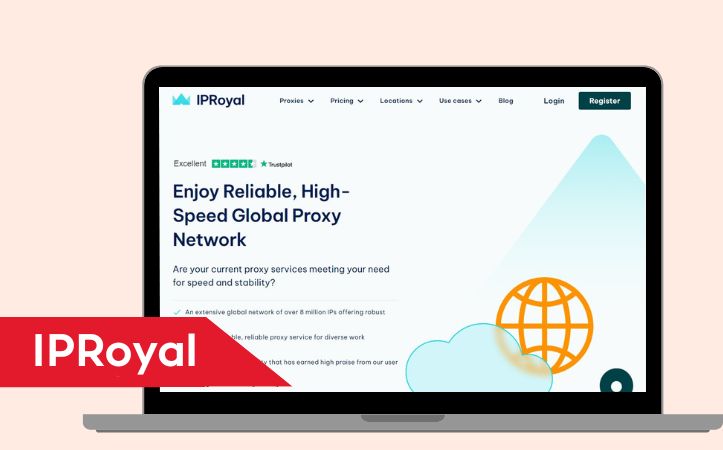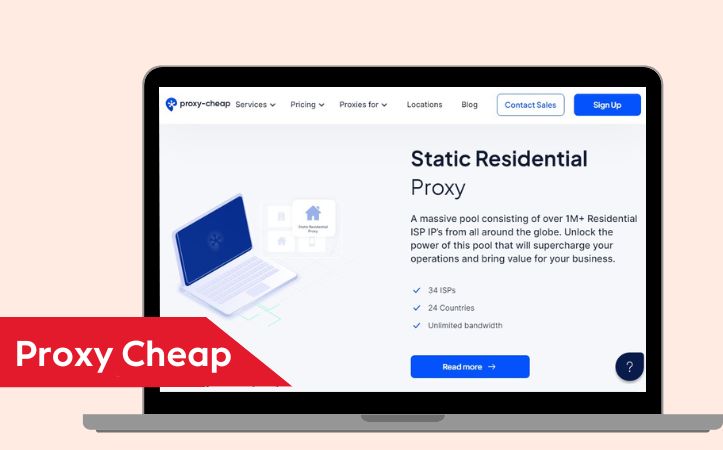Proxy IP is a technology that transfers data traffic through the server, which allows the user's real IP address to be hidden and replaced with the IP address of the proxy server. When users send network requests to other websites, these requests will pass through the proxy server, and then the proxy server will communicate with the target website, thus hiding the real IP address information.
Proxy IP can be divided into dynamic proxy IP and static proxy IP:
Dynamic proxy IP:Refers to changing multiple different IP addresses within a certain period of time according to the settings of the provider.
Static proxy IP:Refers to a group of IP addresses owned by the provider in a specific location, and all proxy requests will be forwarded to this server, maintaining a fixed IP address.
Proxy IP has many uses, such as privacy protection, anti-crawler, cross-border e-commerce, etc., but the use of proxy IP also needs to pay attention to its legality and follow relevant regulations.
Proxy IP acquisition form
Proxy IP usually consists of IP address, port, account number and password. Among them, the IP address is the address of the server being proxied, the port is the digital identifier used when transferring data between network applications, and the account number and password are authentication information that need to be provided when accessing the proxy server.
By using proxy IP, users can hide their real IP address to protect their privacy and security. At the same time, proxy IP can also help users break through geographical restrictions and access blocked websites and content.
IP address port account password 127.0.0.1 0/65536 username password There is another form, through the IP whitelist, which can be accessed without user + password
What are the types of proxy IP?
There are many types of proxy IPs, and different types of proxy IPs are suitable for different scenarios. Choosing the appropriate proxy IP type can improve access speed and stability.
The proxy ip is classified according to the request protocol:
1、HTTP proxy:HTTP proxy is one of the most common types of proxy. It only supports HTTP protocol and is suitable for operations such as accessing web pages and sending emails.
2、HTTPS proxy:HTTPS proxyIt is a proxy type that supports the HTTPS protocol, which is more secure than an HTTP proxy and is suitable for scenarios that require encrypted data transmission.
3、SOCKS proxy:SOCKS proxyIt is a relatively general proxy type that supports TCP/UDP and various application layer protocols, and is not limited to HTTP and HTTPS protocols. Compared with HTTP and HTTPS proxy, SOCKS proxy is faster, but relatively complicated to use.
4、FTP proxy:FTP proxyIt is a proxy type specially used for file transfer protocols, and is suitable for operations such as uploading and downloading files.
5、tunnel proxy:tunnel proxyIt is a proxy performed at the network layer. It establishes a virtual channel between the proxy servers running at both ends, and encapsulates the proxy data packets for transmission. Tunnel proxy is usually used to bypass blocking measures such as firewalls.
Proxy ip is classified according to anonymity:
1、transparent proxy:transparent proxyIt will not modify any content requested by the client, and the client can use it without any special configuration. But the transparent proxy cannot hide the real IP address of the client, and it is easy to be detected and blocked.
2、anonymous proxy:anonymous proxyIt will hide the real IP address of the client, but will not modify the client's request. The client can discover the use of anonymous proxy through some special means.
3、Highly anonymous proxy:Highly anonymous proxy also hides the client's true IP address,And it will also disguise the client's request header and other information, making it more difficult for the client to be identified and tracked. Compared with transparent proxy and anonymous proxy, Highly anonymous proxy has higher security and better stability, but the price is relatively high.

Proxy ip is classified according to commercial distribution:
Dynamic Proxy IP
Dynamic Proxy IPIt means that when using a proxy, the proxy server will change the IP address regularly, so that the client using the dynamic proxy can automatically switch the IP address and avoid the risk of being blocked and detected.
Compared with static proxy IP, this type of proxy IP is more difficult to be identified and blocked by the target website, because the proxy server will constantly change the IP address, thus ensuring the validity and stability of the proxy IP. Dynamic Proxy IP is usually suitable for scenarios that require a large number of IP addresses for crawling, data collection, search engine optimization, and anonymous access.
| name | alias | English name |
|---|---|---|
| Dynamic Proxy IP | Rotate proxy IP, rotate proxy | Rotating proxies IP |
Static proxy IP
Static proxy IP means that when using a proxy, the IP address provided by the proxy server is fixed. Clients using a static proxy IP will use the same IP address every time they connect to the proxy server
Compared with dynamic proxy IP, this type of proxy is more likely to be identified and blocked by the target website, because the IP address provided by the proxy server is static and vulnerable to detection and restriction by the target website. Using a static proxy IP is usually suitable for some scenarios that do not require high proxy IP stability and low access frequency.
| name | alias | English name |
|---|---|---|
| Static proxy IP | long-term proxy | Static Proxies IP |
Residential Proxy IP
Residential Proxy IPIt refers to the use of the IP address provided by ordinary family residential networks (such as China Telecom, China Unicom, China Mobile, etc.) as a proxy server for other clients to access.
This type of proxy is often used in some scenarios that need to simulate real user access behavior, because Residential Proxy IP is easier to gain the trust of the target website, so as to avoid being identified and blocked. Compared with the data center proxy IP, the stability and reliability of the Residential Proxy IP are worse. At the same time, due to the large number of users, the bandwidth and speed will also be affected.
| name | alias | English name |
|---|---|---|
| Residential Proxy IP | Residential Proxy IP | Residential Proxy IP |
Data center proxy IP
Data center proxy IPRefers to the IP address provided by the data center or hosting service provider (such as Amazon, Google, Alibaba Cloud, Tencent Cloud, Baidu Smart Cloud, etc.) as a proxy server for other clients to access.
This type of proxy is often used in some scenarios that require large-scale crawling of data, because the Data center proxy IP has high stability, fast speed, and sufficient bandwidth resources. Compared with Residential Proxy IP, Data center proxy IP is easier to be identified and blocked by the target website, but because of fewer users, it is relatively more stable and reliable.
| name | alias | English name |
|---|---|---|
| Data center proxy IP | Data center proxy IP | Datacenter proxies |

Mobile proxy IP
Mobile proxy IP It is an IP address provided by a mobile operator, usually a dynamic IP assigned by a mobile phone or other mobile devices (such as a 4G router).
Using Mobile proxy IP can simulate the real identity of the mobile terminal to access, because the mobile terminal has different operating systems, browsers and network environments compared with the PC terminal, so in some cases it is necessary to simulate the mobile terminal for data crawling or testing occasions is very useful. However, due to the poor real-time performance of Mobile proxy IP, which is easily interfered and restricted by operators, it is more unstable than Residential Proxy IP and Data center proxy IP. In addition, because the Mobile proxy IP is widely used, it is easy to be detected and blocked by the target website.
| name | alias | English name |
|---|---|---|
| Mobile proxy IP | 4G Proxy IP | Mobile proxies |
Application Scenarios of Proxy IP
Dynamic Proxy IP application scenarios
Dynamic Proxy IPCompared with Static proxy IP, it is more difficult to be identified and blocked by the target website, because the proxy server will constantly change the IP address, thus ensuring the validity and stability of the proxy IP. Dynamic Proxy IP is usually suitable for scenarios that require a large number of IP addresses for crawling, data collection, search engine optimization, anonymous access, etc.。
Applicable scene:Crawler proxy, mass mailing, seo optimization, increase advertising traffic
shortcoming:Unable to use for a long time, expensive, easy to be blocked
Static proxy IP application scenarios
Static proxy IPCompared with Dynamic Proxy IP, it is easier to be identified and blocked by the target website, because the IP address provided by the proxy server is static and vulnerable to detection and restriction by the target website. Using Static proxy IP is usually suitable for some scenarios that do not require high proxy IP stability and low access frequency.
Applicable scene:Social media account use, ads advertising, operating self-media accounts
shortcoming:Easy to be blocked, speed limit
Residential Proxy IP application scenarios
Residential Proxy IPIt is often used in some scenarios that need to simulate real user access behavior, because Residential Proxy IP is easier to gain the trust of the target website, so as to avoid being identified and blocked. Compared with Data center proxy IP, the stability and reliability of Residential Proxy IP are worse, and because there are many users, the bandwidth and speed will also be affected.
Applicable scene:Social media account operation, self-media account operation, e-commerce shopping
shortcoming:speed limit
Data center proxy IP
Data center proxy IP is often used in some scenarios that require large-scale crawling of data, because Data center proxy IP has high stability, fast speed, and sufficient bandwidth resources. Compared with Residential Proxy IP, Data center proxy IP is easier to be identified and blocked by the target website, but because of fewer users, it is relatively more stable and reliable.
Applicable scene:Social media app login, APP testing, posting articles, mobile game on-hook, e-commerce shopping
shortcoming:easily blocked
Mobile proxy IP application scenarios
It is very useful in situations where it is necessary to simulate the mobile terminal for data crawling or testing. However, due to the poor real-time performance of Mobile proxy IP, which is easily interfered and restricted by operators, it is more unstable than Residential Proxy IP and Data center proxy IP. In addition, because the Mobile proxy IP is widely used, it is easy to be detected and blocked by the target website.
Applicable scene:Social media app login, APP testing, posting articles, mobile game on-hook, e-commerce shopping
shortcoming:Charged according to flow rate, the price is more expensive
Summarize
Proxy IP is an intermediate entity used to forward network information between client and server. The device or software using the proxy IP does not directly communicate with the target server, but sends the request to the proxy server, and the proxy server forwards the request and obtains the response data, and then transmits the response data back to the requester, so as to protect privacy and firewall penetration penetration, anti-reptile and other purposes.
Proxy IP can be divided into HTTP proxy、HTTPS proxy、SOCKS proxy、anonymous proxy、transparent proxy、Highly anonymous proxyThere are many types, and the application scenarios are also very wide, such as data collection, network security testing, location-targeted advertising, network marketing, etc. At the same time, the quality of proxy IP is also very different. High-quality proxy IP can improve the success rate of crawling and protect privacy and security, while low-quality proxy IP may waste time, money and bring more problems.


